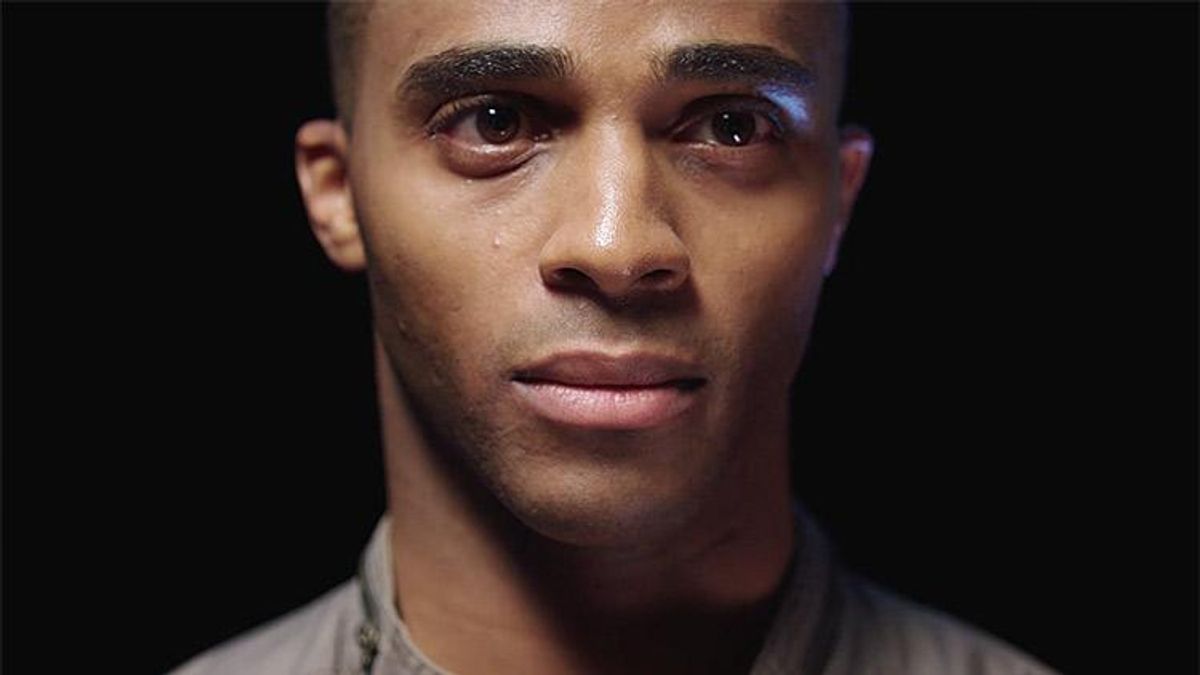People lucky enough to be born not straight can also be born into a limitless number of other circumstances that make living one's truth exceedingly difficult. Case in point: the third episode of Falling for Angels, set in Leimert Park, a majority-black neighborhood in south Los Angeles, that details a closeted man whose life turns unsustainable.
Writer-director Waymon Boone, who lives in Los Angeles, wanted to tell a story about "how much living your truth can affect those around you." The producers pushed him into not sugar-coating it. "They pushed me to be very truthful and very real," he said.
Protagonist Abraham (Aaron D. Alexander) got lucky in some ways. He's handsome, well-built, and deep-voiced. He has a girlfriend who he lives with. He has a steady job and "a way with words"; the first scene sees him reciting pretty good slam poetry and being lauded for it by his middle-class family, who has come to watch him perform for the first time. His father didn't come, but his parents are married.
The problem is, of course, that Abraham likes men. Whether he is gay or bisexual is never made clear, and it doesn't really matter. Terick (Blake Young-Fountain of The Skinny) is handsome, lithe, clearly gay and openly so. Abraham recoils when Terick approaches him in public but keeps showing up at his apartment.
The interplay between individual men and an idealized masculinity is one of the most explored concepts in any creative medium from any age. When done well, this work is meritorious and important -- especially in these times when the most commonly paired adjective with "masculinity" is, rightfully, "toxic." The interplay is explored in "Leimert Park" with broad strokes, perhaps so broad because of the complex and unique issues regarding masculinity and gender dynamics in the black community -- especially when queerness is thrown into the mix.
Abraham's inability to maintain a life in the closet, regardless of the fact that he can pass as straight (or perhaps because of it) drives the plot. This is a coming-out story that's also about liberation, one about the havoc that being closeted creates.
"I think one of the most important things of being yourself is not leaving a path of destruction behind you," said Boone.
Terick is attached to an emotionally unavailable man (Boone smartly does not detail or romanticise the two actors' intimacy). Michelle (Ruby Lee Dove), Abraham's partner, cannot at first understand why her relationship is loveless and failing, like countless women in her position. When word of her partner's infidelity reaches her and is confirmed by physical evidence, her most forthright concern is for her own safety. "Are you putting me at risk?" she asks plaintively and tearfully. The disproportionate rate of HIV infection among black men who have sex with men may well be connected with black women's similarly disproportionate affliction, perhaps the most insidious repercussion of closet culture.
There are elements of "Leimert Park" to critique. The dialogue is often a little on-the-nose; ditto for the slam poetry asides. Boone's directoral flights of creativity sometimes succeed, as in the beautiful shot depicting Terick's gloomy solitude framed by impossibly expansive bedsheets. Sometimes they detract: scenes where the music shifts and the background dissolves to emphasize a very important conversation between characters. Each director has a unique vision, and the anthology structure allows for free exercise, but these scenes take away from Falling for Angels' realism, its best quality.
What makes "Leimert Park" work is its rapid acceleration of action and uneasy denouement. It is nice to think that coming out leads uniformly to an affirmative, actualized life, but it is clear that Abraham's life post-reveal will be significantly more complicated than it was before. But this is the way it must be. A life in the closet is a life based on a lie -- and this life, Abraham's expression of manhood, was a lie that proved impossible to maintain.
"How do you come out clean in the end?" asks Boone. Stripped of the lie, however, one hopes that Abraham will be an honest man and a better man. His gift for self-expression implies that he has the capacity to do it, and what a gloriously gay trait that is.
Watch the episode below.



















































































Fans thirsting over Chris Colfer's sexy new muscles for Coachella